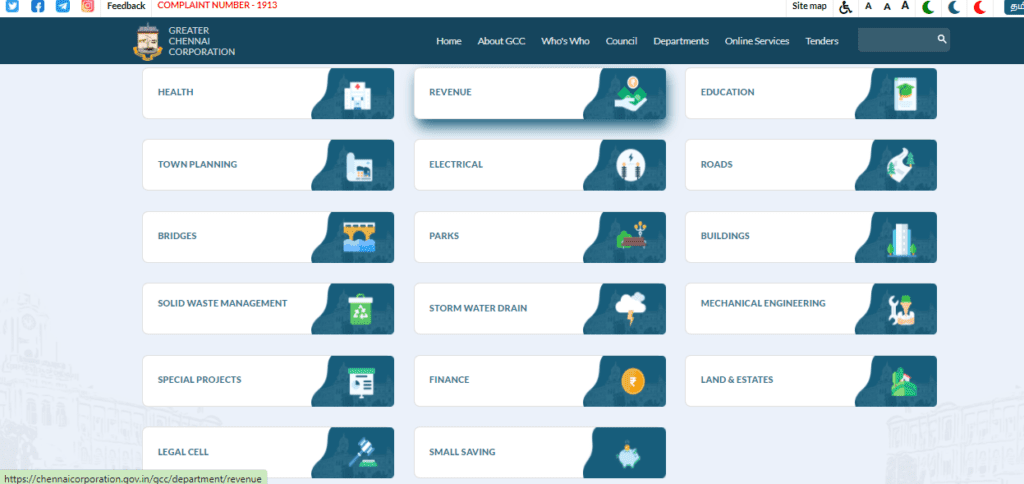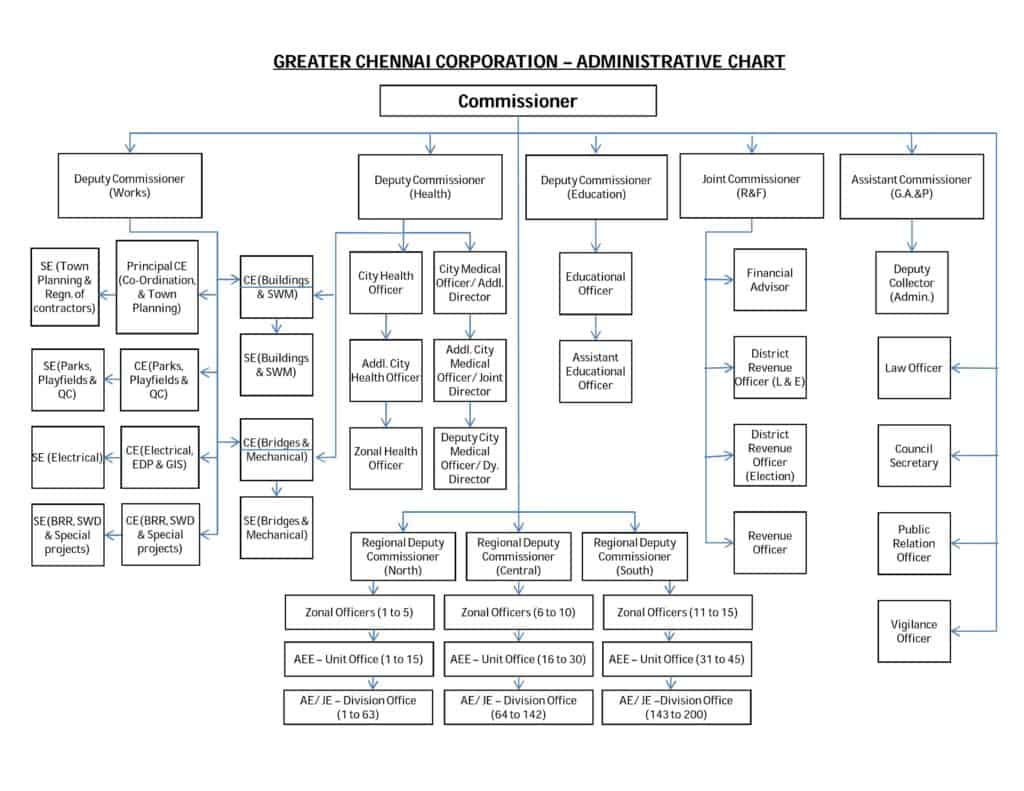“People in Chennai have almost forgotten what it is like to have an elected representative from their wards,” jokes Charu Govindan, coordinator of Chennai-based citizen’s group, Voice of People. Charu was referring to how the city has gone without an elected local body council for an entire term since 2016. Although the official website of the Greater Chennai Corporation (GCC) still states that the administrative set up includes a council of 200 councillors, headed by a Mayor, that hasn’t been the case in the past five years. Local body elections have not been held since the term of the last council expired.
Over this period, that is since October 2016, GCC, the civic body that governs Tamil Nadu’s capital city, has been administered by a set of officials led by a Commissioner, who is an IAS officer. This, however, is not the first time that the GCC, which is also India’s oldest municipal institution, is operating in the absence of an elected council. In 1973, when the Dravida Munnetra Kazhagam (DMK) government was in power in the state, the Corporation Council in Chennai was suspended following the muster roll scandal. The administration of the corporation then, as it is now, was handed over to a special officer of the IAS cadre.
Read more: Missing! Our city’s Corporation
It went on to function under bureaucrats for over twenty years, until 1996, when the DMK government once again came to power in the state and ordered for civic polls. Similarly, with the DMK having taken charge of the state government in May this year, the MK Stalin-led cabinet has called for polls to various local bodies in the state.
With elections on the cards, it’s important for us as citizens to understand how the city is divided for the purpose of administration, the zones or the wards we belong to and more importantly how the corporation functions in Namma Chennai.
Administrative divisions
As mentioned before, unlike several cities in states like Kerala or Karnataka, the Corporation of Chennai has not been headed by a Mayor over the last five years and instead was administered by a bureaucrat, who is referred to as the Commissioner of the Corporation.
The Commissioner is further assisted in the administrative process by various Deputy Commissioners and Joint Commissioners, who are in charge of various departments like Health, Works, Education, Revenue and Finance and so on. These officials are also, more often than not, officers in the civil services cadres.
Zones and wards
Now, for the purpose of administration, the city is divided into three regions: North Chennai, Central Chennai and South Chennai. These three regions are further divided into 15 zones, consisting of 200 wards. The various zones that come under the three regions and the respective ward numbers in each zone are:
North Chennai
I. Thiruvottiyur: 1 to 14
II. Manali: 15 to 21
III. Madhavaram: 22 to 33
IV. Tondiarpet: 34 to 48
V. Royapuram: 49 to 63
Central Chennai
VI. Thiru Vi Ka Nagar: 64 to 78
VII. Ambattur: 79 to 93
VIII. Anna Nagar: 94 to 108
IX. Teynampet: 109 to 126
X. Kodambakkam: 127 to 142
South Chennai
XI. Valasaravakkam: 143 to 155
XII. Alandur: 156 to 167
XIII. Adyar: 170 to 182
XIV. Perungudi: 168, 169, 183 to 191
XV. Sholinganallur: 192 to 200
For each of these three regions, there is a Regional Deputy Commissioner in charge, who is further assisted by Zonal Officers at the zonal level and Assistant Engineers at the ward level. When an elected council was there, each of these 200 wards used to elect a representative or a councillor, who would act as a bridge between the residents of that ward and the Corporation.
There was also a system of ward committees in each of the 15 zones, where the councillors of the respective wards used to discuss the various issues in their zones to be presented before the Mayor during the Corporation Council meetings.
Corporation Departments
The GCC, established in 1688 (then Corporation of Madras), is the institution that maintains the city’s streetlights, cleanliness and hygiene, drainage systems, many of the roads and junctions, parks and several public spaces, registration and issue of birth and death certificates and so on.
Read more: Who administers and provides public services in Chennai?
However, with the presence of various levels of parliamentary and local levels of administration, several citizens are still confused about whom to approach for what. For example, Charu says that during the 2019 Lok Sabha elections, several residents complained to the MP candidates regarding local issues such as improper streetlights or poor road conditions, which generally fall under the control of the local administration.

It is therefore helpful to have an understanding of the different departments within the GCC and their respective functions.
Revenue Department
Under the supervision of a Revenue Officer, this is the department that is responsible for the collection of Property Tax, Professional Tax, Advertisement Tax, Collection of Parking fees and other taxes. This is also the department that should be approached for matters concerning the change of name of ownership of properties.
Read more: A guide to understanding the revenue and expenses of Chennai Corporation
Works Department
Matters such as town planning, which includes sanctioning and approval of building plans, issues related to electricity like maintenance of street lights, laying of cables, Solid Waste Management, construction of public infrastructure and matters relating to stormwater drains all fall under the Works Department. Each of these issues also have an assigned Superintending Engineer who is a specialist in that particular field.
Health Department
Under the supervision of a City Health/Medical officer, this is the department that looks after the administration of dispensaries, public health, sanitation, prevention of food adulteration, issue of birth & death certificates and so on.
Education Department
This department looks after the administration of schools — from elementary to higher secondary levels, community colleges and nutritious meals centres. It is headed by an Education Officer.
In the presence of an elected council, there was a Standing Committee for each of these departments. These Standing Committees were headed by a chairman elected by the councillors. These committees used to convene a meeting every month and pass a resolution which was sent to the Council for approval.
The need for an elected council
In a system of local self government, people’s representatives, or in the case of a Municipal Corporation, the elected councillors act as a link between the residents of a particular ward and the Corporation officials. So the duty of the councillor is to address the issues of the residents living in his ward at the Corporation council or take it to the required official and get it sorted.
However, in the case of Chennai, where there has not been an elected council, the residents have had to directly approach the corporation officials to find solutions for various problems in their locality. This kind of a system, according to citizen activists, lacks accountability, since the authorities are not directly elected by the people and hence not answerable to them.
“For example, if there is an issue with regard to road repairs happening in a certain area and the residents want to raise a complaint regarding it or bring it to the attention of the officials, they find it difficult to do so because those who are coming to work are the contractors and not Corporation officials. They cannot question the contractors, who are only carrying out instructions as per senior officers. And the people also do not have the time and energy to find out who these officers are and go after them. That is where there is a need for an elected representative. The people can go and complain to their councillor, who will in turn take the issue to the respective officials,” says Charu.
Read more: With no elected councillors in office, how will Chennai take on the monsoon?
Another issue is with regard to the transparency of functioning. Residents often come to know about huge amounts of funds allocated for various projects like pavements and roads in their wards through the media, though they might actually have a more pressing and urgent requirement for something else.
For example, the residents of a locality might urgently need a site for decentralised solid waste processing or they might need the road to be relaid, but they may wake up one fine morning to find the money being spent on unnecessary or extraneous projects such as painting of walls, changing of name boards etc.
“There is no transparent system to find out about the budget of the wards and how it’s being used. There is no participatory budgeting,” says Charu, who also adds that a people’s representative will not make everything perfect but at least there would be a system to hold the representatives accountable and question them when they come back to the people asking for votes.
The same thoughts were reiterated by Radhakrishnan, an activist with Arappor Iyakkam. “When it comes to various civic issues, we have to approach the Assistant Engineers in charge of our ward. But they may not be able to address our concerns since they have several operational tasks to look after. But if we can inform the councillor, he/she could put pressure on the corporation officials to ensure that the citizen’s concerns are sorted,” says Radhakrishnan.
‘Perfectly alright without an elected council’
While many have raised their concerns about not having an elected local body, some residents have stated that they find it easier to get their grievances heard through the Corporation officials. “Getting the councillors to solve a problem is impossible. Without their interference now, we are able to directly reach out to the officials and address our issues,” says VS Jayaraman, president of the T Nagar Residents Welfare Association.
Jayaraman says that the system of local self government is ideally well suited in a democracy but for that he also adds that, “for that, the Councillors should also ensure that they do their job well, consult residents regularly, find out the problems they face and address it in the council, which most of them fail to do.”
Also read:
- What are the roles and responsibilities of your elected MLA?
- Chennai budget raises many questions, but whom should we ask?
- What does the Corporation achieve by continually changing street names?

A very well analysed write-up. It will serve as a treasure trove to the public as also even to the officials as many do not know what purpose does the GCC serve.
Time to time I hear and read that some citizens and RWAs find it relatively easy to work directly with officials, rather than Councillors. It is mainly because they have the access and know the channels. But for the majority of urban population which doesn’t come under such organised RWAs, it is always a challenge to communicate to the administration both their needs and issues. Even RWAs cant hold the officials accountable.
Votes have a way holding the Councillors accountable once in five years, atleast. However, if the State government mandates participatory platforms like Ward Committees and Area Sabhas after the impending Urban Local body elections, then common people and RWAs can interact/communicate with elected representatives and officials directly and consistently throughout the elected term. The city population should be demanding it in one Voice now.